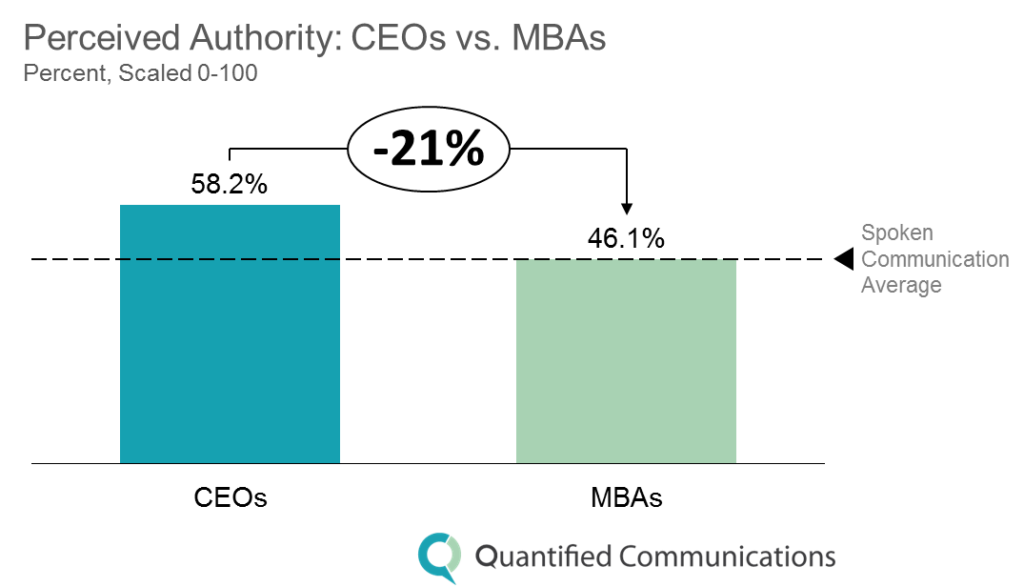What Can CEOs Teach MBA Students about Leadership Communication?

At Quantified Communications, we use data analytics to help professionals understand and improve the impact their communication has on customers, employees, and investors. We’ve worked with leadership and communications teams at leading global organizations, but we’ve also spent time working with aspiring leaders in top MBA programs.
So as graduation season wrapped up, releasing a new crop of MBAs into the corporate world, we wondered what communication skills these young leaders already excelled at and what they could learn from their older, wiser counterparts.
To find out, we compared random communication samples from 150 MBA candidates and 150 corporate executives.
Here’s what we found:
MBA Candidates Excel in Two Key TMetrics: Persuasion and Trust
In Persuasion, the MBAs Found the Right Mix of Head, Gut, and Heart

Persuasion theory tells us that we can reach audiences by appealing to their heads (logos), guts (ethos), and hearts (pathos), while the most persuasive speakers employ a combination of all three—tailored, of course, to the specific needs of their audience.
While both the CEOs and MBAs blended ethos, pathos, and logos in their communication, we found that the MBAs actually scored higher overall because they offered more appeals to their audiences’ gut, or intuition, than their CEO counterparts. This credibility-building language includes references to prior experience and achievements, and it makes sense that we’d see more of it from the MBAs. An unfamiliar speaker (such as a brand-new leader) has to spend some time convincing the audience to trust her, and one way to do that is to show the audience that other people, people they already know and trust, respect and believe in her.
Seasoned CEOs, on the other hand, may not need to spend as much time appealing to audience intuition, especially when they’re addressing the same groups on a regular basis—their names come with all the credibility they need.
The MBAs also came out ahead in the use of sensory language, a key element of pathos (appeals to the heart), which is meant to create vivid mental pictures that evoke feeling and emotional connection in an audience.
More about Persuasive Communication
The Data Says Lead with Emotion: Linguistic Analysis of the World’s 50 Greatest Leaders
The Science-Backed Way to Convince Your Boss to Say Yes
Along with CEOs, MBAs Inspire Trust in Their Audiences

When we measure trustworthy communication, we look at patterns associated with deception, such as negative sentiment and overly complex language, as well as more positive traits like accountability and a level of detail that is cognitively difficult to convey.
Both groups score in the top 30 percent of our database for their use of trustworthy language; they are just over one percentage point apart. However, their scores were driven by different variables.
The MBA score was driven by the willingness this younger group demonstrated to take responsibility for their messages, using 105 percent more personal pronouns than the CEOs. (To see how this works, consider the infamous “Mistakes were made.”)
On the other hand, the executives we measured were far more balanced in their emotional tones, using 19 percent less negative language. They were also 8 percent more direct, getting right to the point rather than talking around it, which often makes listeners wonder whether a speaker is trying to cover something up.
More about Trustworthy Communication
Video: How to Spot a Liar
However, MBA Candidates Have Plenty to Learn from CEOs
Despite the strengths of the up-and-coming leaders, it’s no surprise that the CEOs we measured are, on average, stronger communicators than the aspiring candidates. After all, they’ve got years of experience behind them.
Two of the key learning opportunities CEOs offer their greener counterparts are in linguistic assurance (that is, the language they use to convey their own confidence in their message) and authority.
MBA Candidates’ Lower Assuredness Scores Driven By Tentative, Uncertain Language

The key to demonstrating assuredness is to use confident language. That is, leaning on the words that express certainty—“absolute,” “must,” “definite”—and avoid the ones that indicate hesitation or tentativeness—“might,” “fairly,” “seem.”
The CEOs we measured outperformed the MBA candidates on both accounts, using 8 percent less tentative language and 35 percent more words demonstrating certainty.
Research has shown that when speakers use vivid, concrete language rather than uncertain or vague terminology, audiences are more likely to perceive them as confident and assured — and more likely to feel confident and assured themselves.
Here, you can see the difference for yourself:
I think this initiative will probably bring in a good number of new customers, and even some revenue from existing customers.
vs.
This initiative is sure to bring in significant revenue from both new and returning customers.
Which one are you more likely to believe?
CEOs’ Perceived Authority Comes from More than Experience

Our CEOs demonstrate, on average, 26 percent more authority than the MBA candidates, and it’s tempting to write off that difference as a side effect of experience. But according to executive communication expert Briar Goldberg, even the greenest newcomer can be authoritative. It all comes down to preparation.
This means considering your audience’s experience and perspective to make sure you’re personalizing your message to their needs, and then rehearsing your message before you deliver it.
All of us—especially those CEOs—are busy, and we can find plenty of time to skimp on preparation. But Goldberg says that even one rehearsal session will enable you to deliver a far stronger presentation than you could give on the fly. Of course, she adds, more is better. But once is a must. After all, even the most seasoned veteran is not likely to sound authoritative if he’s fumbling over his words.
Our country’s aspiring leaders certainly have plenty to learn from today’s executives, but we were pleased to find a few areas in which the younger generation is already excelling. Our research shows that the most effective leadership communication demonstrates accomplishment in key metrics across the board.